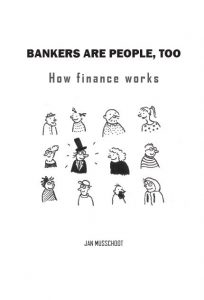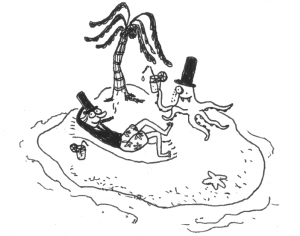My book Bankers are people, too was published on this day one year ago.
A big ‘thank you!’ to all readers and supporters!
My book Bankers are people, too was published on this day one year ago.
A big ‘thank you!’ to all readers and supporters!
The ten year anniversary of Lehman Brothers’ bankruptcy is fast approaching. Some quick thoughts on what has changed and what we’ve learned over the past decade, with a focus on Europe.
The Up to the Mountains and Down to the Countryside Movement was a government policy in the People’s Republic of China during the 1960s and 1970s. From Wikipedia: “privileged urban youth [were] sent to mountainous areas or farming villages to learn from the workers and farmers there.”
A lot of economists and economic historians study aggregated data, e.g. gross domestic product, inflation, trade flows, or productivity.
Such a high level approach is valuable. However, the macro perspective by definition misses the details. A macroeconomist will typically explain productivity growth by referring to increases in (human) capital and total factor productivity. But how exactly do concrete changes lead to higher output? Continue reading “Down to the corporate side!”
Wired has a great article (warning: long but worth your time) on last year’s cyberattack. It started as part of the Russian cyberwar against Ukraine. Almost immediately, companies around the world became collateral damage. Andy Greenberg’s Wired story highlights the impact on shipping giant Maersk.
Just to illustrate the vulnerability of IT systems:
Maersk’s 150 or so domain controllers were programmed to sync their data with one another, so that, in theory, any of them could function as a backup for all the others. But that decentralized backup strategy hadn’t accounted for one scenario: where every domain controller is wiped simultaneously. “If we can’t recover our domain controllers,” a Maersk IT staffer remembers thinking, “we can’t recover anything.”
The total damage caused by the attack has been estimated at $10 billion…
“War is Peace
Freedom is Slavery
Ignorance is Strength“
– Slogan on the building of the Ministry of Truth (George Orwell, 1984)
The financial news offers an endless stream of scary stories and opinions.
Should you sell your stocks because of the news?
Maybe. But probably not. Continue reading “Ignore the news”
Public service announcement: Brad Setser is the go-to guy for all things related to international trade and money.
A few additional points here —
As I find the balance sheet of Turkey's banks fascinating. https://t.co/zm8GfmlVU7
— Brad Setser (@Brad_Setser) August 20, 2018
The central government debt of Turkey was 28 percent of the country’s gross domestic product (GDP) at the end of 2017.
Although making financial predictions is usually a fool’s game, I’m pretty confident that by the end of 2020, the central government debt of Turkey will be higher than 40 percent of GDP.
My prediction is based on the ongoing crisis. Private debt tends to become public debt in these circumstances. Because the debt is dollar-denominated, it cannot be inflated away.
Check this post in 2021!
The European support program for Greece ends today. Some called the program a bailout, others assistance or solidarity. Whatever you call it, the outcome has been abysmal.
You did it! Congratulations to Greece and its people on ending the programme of financial assistance. With huge efforts and European solidarity you seized the day.
— Donald Tusk (@eucopresident) August 20, 2018
Greece fared worse than the US during the Great Depression. Emerging markets recovered faster from financial crises than Greece did. The only countries that have shrunk more than Greece in the past ten years are failed states like Libya, Yemen, and Venezuela.
“Congratulations” to all who were responsible for this “success”.

The blog is on summer vacation.
I’ll be back mid-August with posts on banking, economics, management, personal finance, self-publishing, and education. I also have some book reviews lined up.
Enjoy the summer!
Some years after the crisis of 2008, Dutch journalist and anthropologist Joris Luyendijk set out to learn more about the people in the financial industry. Through a series of interviews with bankers, he was able to paint an impression of what it’s like to work in London’s banks. Continue reading “What type of banker are you?”